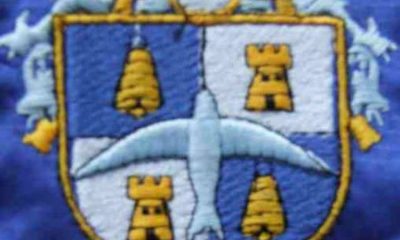News
Sea Empress oil spill: 25 years since Wales’ biggest ecological disaster
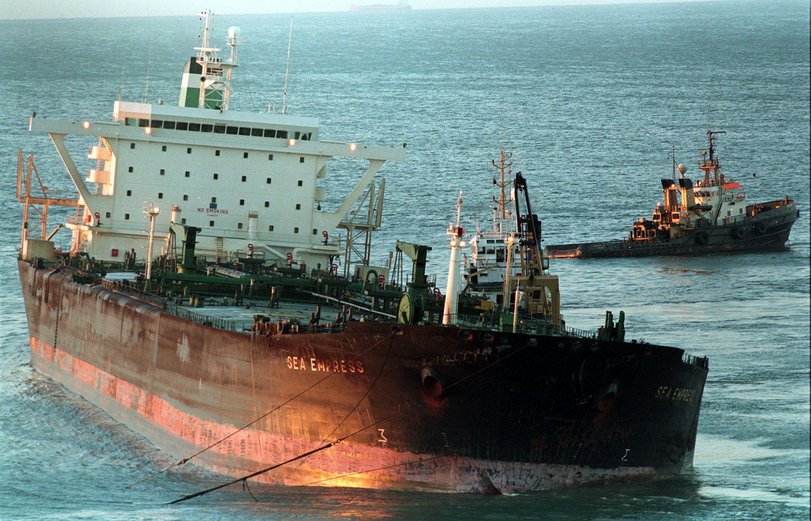
IT’S EXACTLY 25 years since Wales’ worst ecological disaster – single hull oil tanker hit rocks in the middle of the channel, holing her below the waterline.
On 15 February 1996, the Sea Empress oil tanker ran aground as it entered the Milford Haven Waterway.
Six days later, the tanker re-floated and was towed into the harbour. In the days between its grounding and towing, the oil tanker spilled 72,000 tons of crude oil along the Pembrokeshire Coastline, within the Pembrokeshire Coast National Park.
It was a Thursday morning the oil tanker was en route to the Texaco oil refinery when she became grounded on mid-channel rocks at St. Ann’s Head. Over the course of a week, she spilt 72,000 tons of crude oil into the sea. The spill occurred within the Pembrokeshire Coast National Park – one of Europe’s most important and sensitive wildlife and marine conservation areas.
Sailing against the outgoing tide and in calm conditions, at 20:07 GMT the ship was pushed off course by the current and became grounded after hitting rocks in the middle of the channel.
The collision punctured her starboard hull causing oil to pour out into the sea. Tugs from Milford Haven Port Authority were sent to the scene and attempted to pull the vessel free and re-float her. During the initial rescue attempts, she detached several times from the tugs and grounded repeatedly – each time slicing open new sections of her hull and releasing more oil.
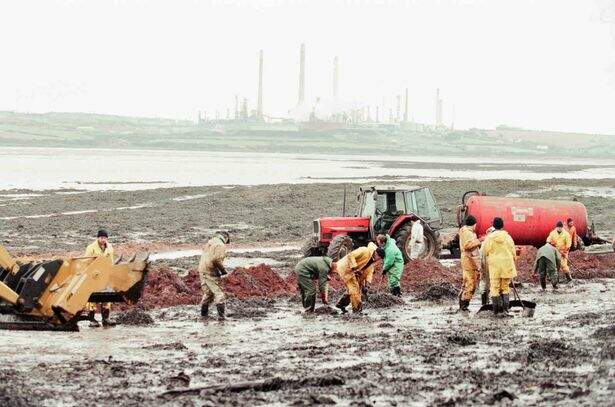
Clean up underway near Dale, Pembrokeshire following the oil spill (Image PA)
RESCUE OPERATION
A full scale emergency plan was activated by the authorities. News of the grounding was first reported at 21:18 on the BBC’s Nine O’Clock News – just over an hour after she ran aground.
Over the next few days, efforts to pull the vessel from the rocks continued.
Assisting the many local vessels, tugboats were drafted in from the ports of Dublin, Liverpool and Plymouth to assist with the salvage operation.
The tanker ran aground very close to the islands of Skomer and Skokholm – both national nature reserves, Sites of Special Scientific Interest (SSSI) and Special Protection Areas and home to Manx shearwaters, Atlantic puffins, guillemots, razorbills, great cormorants, kittiwakes, European storm-petrels, common shags and Eurasian oystercatchers.
Birds at sea were hit hard during the early weeks of the spill, resulting in thousands of deaths. The Pembrokeshire grey seal population didn’t appear to be affected too much and impacts to subtidal wildlife were limited. However, much damage was caused to shorelines affected by bulk oil. Shore seaweeds and invertebrates were killed in large quantities. Mass strandings of cockles and other shellfish occurred on sandy beaches. Rock pool fish were also affected. However, a range of tough shore species were seen to survive exposure to bulk oil and lingering residues.
A rescue centre for oiled birds was set up in Milford Haven. According to the Countryside Council for Wales (CCW), over 70% of released guillemots died within 14 days. Just 3% survived two months and only 1% survived a year.
The Pembrokeshire coast is home to common porpoises and bottlenose dolphins.
The effects of the oil and chemical pollution on these species remains unknown. Significant numbers of both species were recorded in the waters off the Skomer Marine Nature Reserve during the spring and summer of 1996.
The main containment and dispersement of the oil slick at sea was completed within six weeks. However, the removal of oil on shore took over a year until the late spring of 1997. Small amounts of oil were still found beneath the sand on sheltered beaches and in rock pools in 1999 – three years after the spill.
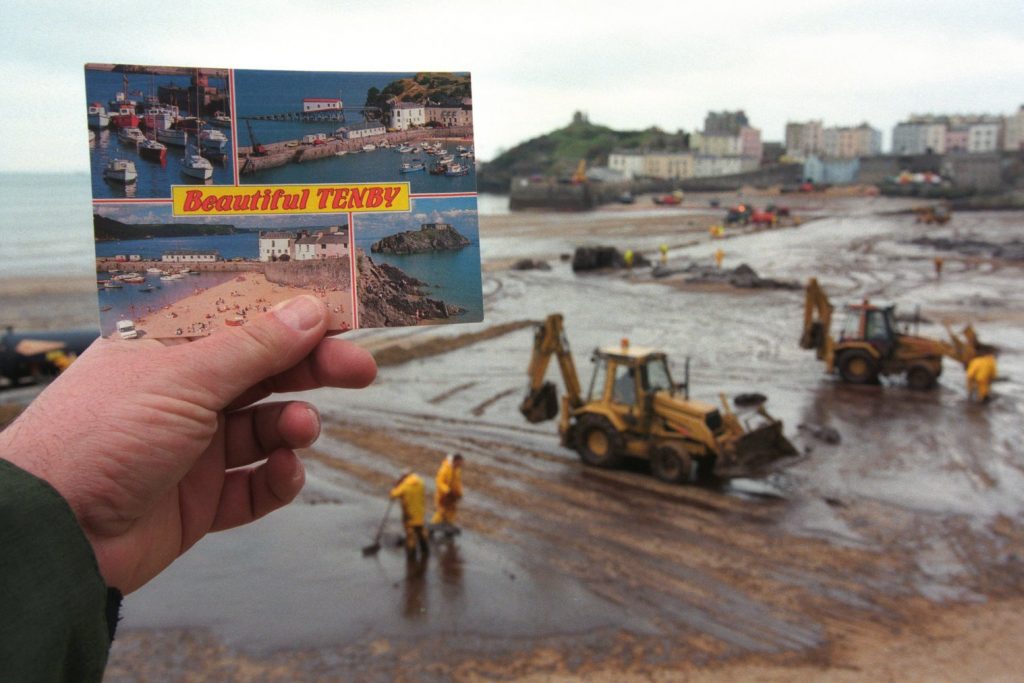
Contractors clean oil from Tenby north beach after the oil tanker Sea Empress ran aground on rocks Pembrokeshire Wales UK (Image: PA)
IT COULD HAVE BEEN WORSE
The effects of the spill were not as bad as initially predicted. This was due in part to the time of year when the spill occurred.
In February, many migratory animals had not yet arrived back in Pembrokeshire for breeding.
Along with stormy weather which helped break-up and naturally disperse the oil, the effect on wildlife would have been much worse if the spill had occurred just a month later.
The spill would undoubtedly have been catastrophic for both the environment and local economy if it had occurred during the summer months.
Much of the Pembrokeshire coastline recovered relatively quickly.
By 2001, the affected marine wildlife population levels had more-or-less returned to normal.
There was an immediate ban on fishing off the coast of Pembrokeshire and south Carmarthenshire which had a devastating impact on the local fishing industry.
The ban remained in place for several months and was lifted in stages.
Many local fishermen received financial compensation for the loss of income due to the ban.
The spill occurred just a few weeks before the Easter break when many holidaymakers would be visiting the area.
Some sheltered beaches and tidal estuaries were still covered with oil, but the main tourist locations of Tenby, Saundersfoot, Pendine, Manorbier and Bosherston were superficially cleaned.
A large clean-up operation began as soon as the Sea Empress started spilling oil.
Volunteers and paid hands alike, came together to restore the beautiful beaches of Pembrokeshire.
In the immediate days and weeks that followed, one thousand people worked around the clock to rescue oiled birds and remove oil from beaches using suction tankers, pressure washers and oil-absorbing scrubbers.
The main clean-up operation lasted several weeks and continued on a reduced scale for over a year.
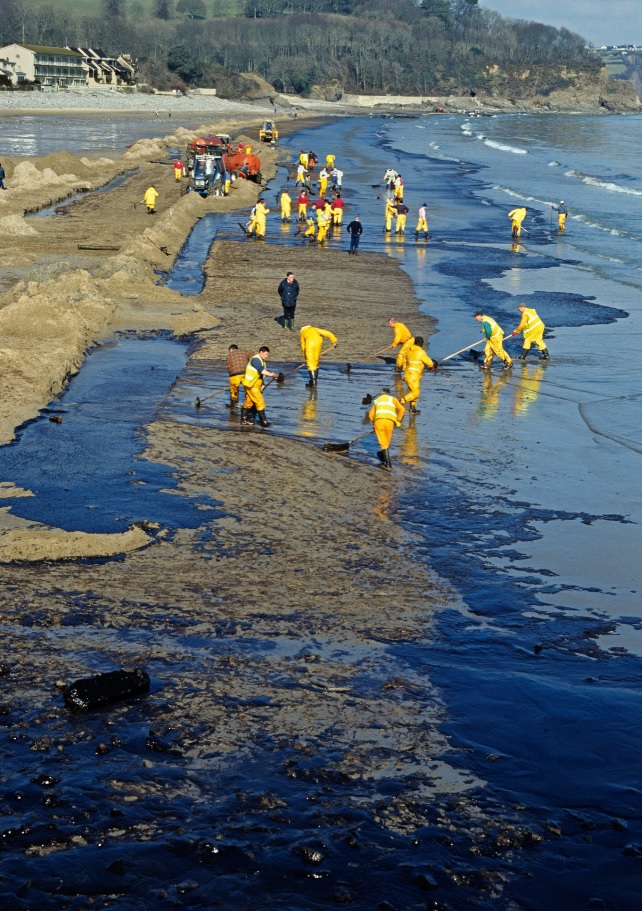
Workmen clean up the spill in Tenby (Image PA)
PORT AUTHORITY FINED £4 MILLION
Almost three years after the spill in January 1999, Milford Haven Port Authority (MHPA) was fined a record £4m after pleading guilty to the offence of causing pollution under the Water Resources Act 1991. The MHPA was also required to pay a further £825,000 prosecution costs by agreement.
The cost of the clean-up operation was estimated to be £60m. When the effects to the economy and environment are taken into account, the final cost is estimated to have been twice that, at £120m.
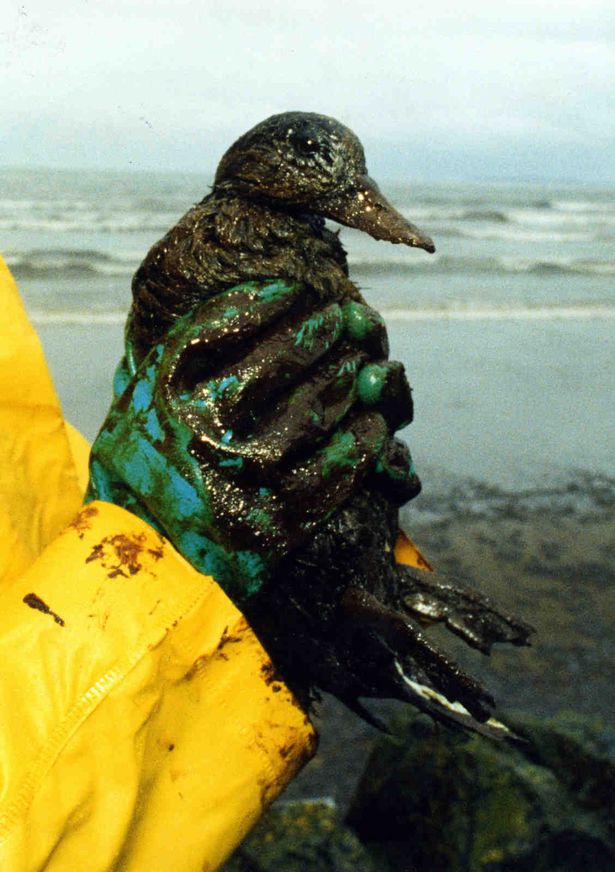
Oiled seabird rescued for cleaning (Image: File)
SHIPS BAD LUCK CONTINUES
While the cause of the initial grounding was found to be due to pilot error, it seems the vessel, even under new ownership, could not escape her run of bad luck. While attempting to dock for scrapping in Bangladesh she was ruptured again, this time by a sunken vessel.
She was renamed a further four times before her final demise, known as MV Front Spirit for a while before being sold under the name MV Ocean Opal, to Chinese buyers.
They used her as a floating storage and offloading unit from 2004. In 2010, she was converted in Shanghai into a bulk carrier, and re-flagged as the Panamanian registered MV Welwind. In 2012, she was renamed for a fifth time: MV Wind 3 and on June 3 that year the 274-metre long vessel was brought to Chittagong in Bangladesh for dismantling at the Shitakunda ship breaking yard.
On the way to the yard the ship developed a crack in one side of its engine room following a collision with a sunken ship, Hang Ro Bong, when she was attempting to anchor at the B (Bravo) anchorage of the port.
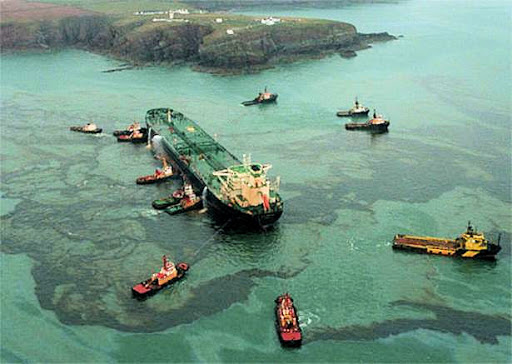
The view from above: The scale of the operation unfolds (Image: Herald archive/MCA)
LESSONS NOT LEARNED
In 2016 former local MP Nick Ainger said that the lessons from the disaster had not been learned
He told BBC Radio Wales’ Sunday Supplement programme that the scrapping of the UK’s emergency towing vessel fleet showed lessons had not been learned 20 years on- The Maritime and Coastguard Agency (MCA) said it was felt the shipping industry should fund such a service.
Mr Ainger said: “We now have a position, 20 years after the Sea Empress, 23 after the Braer, where we have no emergency towing vehicles stationed around our coast.
“Ironically, other countries in Europe, in Spain, in France, Germany, Norway have got government-financed emergency towing vessels.
“We, with our huge coastline with all the shipping that we have coming not only in and out of Milford Haven, but around our shores from the North Sea carrying crude oil, we haven’t got a government-supported emergency towing vessel.
“I think that lesson should be re-learned very, very quickly before we have another disaster.”
An MCA spokeswoman said: “The government believes that responsibility for ensuring the operational safety of ships is properly a matter for the commercial shipping industry, working in partnership with the tug and salvage industries; it did not believe that it was appropriate for the taxpayer to fund this provision.”
She added that no vessel had run aground or foundered in UK waters, nor had any pollution occurred, as a result of a ship being unable to engage a suitable towing vessel.
Following the Sea Empress disaster towing regulations in the Milford Haven waterway were tightened. Following the lead from a Scottish oil terminal, Sullom Voe, ‘escort towing’ was started. Cory Towage sent a representative to Shetland to observe and report back.
At the time the Sea Empress went aground this practice had already started in the Solent for the Port of Southampton, If Milford Haven had done the same in time, the disaster would certainly not have occurred.
Further reading: The Sea Empress’s second accident
Community
County Hall to offer space for community banking
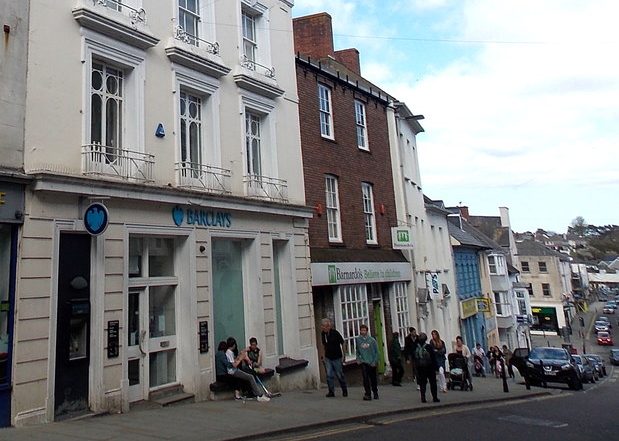
A CALL for Pembrokeshire County Council to potentially change its banking arrangement with Barclays, after it closed its Haverfordwest branch has been turned down, but County Hall is to offer space for community banking.
Barclays Bank, on the town’s High Street, is to close on May 10.
The council has had a banking services contract with Barclays since 2013.
Councillor Huw Murphy, in a notice of motion heard by Pembrokeshire County Council’s Cabinet meeting of April 22, asked the council to review its banking arrangements with Barclays following the announced closure.
e said the loss of a branch “not only impacts upon town centres and businesses but also disproportionately impacts the elderly who are less likely to embrace on-line banking options”.
A report for Cabinet members said, in terms of the impact on Pembrokeshire residents, Barclays has said that it is “not leaving Haverfordwest and [will] continue to provide face-to-face support for those who need it” via community locations.
Two options were presented to Cabinet: to retender the banking services contract, and, the favoured, to work with Barclays to ensure a community location is set up in Haverfordwest.
Members heard the costs associated with moving to a new banking service provider could be in excess of £50,000.
For the second, favoured option, members heard Barclays was in discussions with the council about a location for potential community banking.
Cabinet Member for Corporate Finance Cllr Alec Cormack, after outlining the risks in the report for members, and moving the notice be not adopted, said he had “considerable sympathy” with Cllr Murphy’s notice.
He told councillors there was a glimmer of light for banking arrangements in the county, with an agreement now signed for two ground floor rooms at County Hall, Haverfordwest, to be used for community banking.
From April 25, the rooms will be available on Wednesdays, Thursdays, and Fridays, members heard.
Cabinet Member for Planning & Housing Delivery Cllr Jon Harvey also said he had “a lot of sympathy” for the motion, adding: “It’s excellent news a deal has been struck to occupy the ground floor rooms three days a week; hopefully this will mitigate, to a certain amount, the closure.
“If we can work with the respective banks to get a community-type approach let’s move forward.”
News
Haverfordwest interchange: Next stage of £19m project backed

The second stage of building Haverfordwest’s near-£19m transport interchange has been backed, with senior councillors hearing it could cost the council more to not support it.
The transport interchange, which includes an integrated bus station and construction of a new multi-storey car park, is part of a wider series of regeneration projects in the county town.
The total cost of the scheme in the approved budget is £18.881m, £1.987m from Pembrokeshire County Council; the remainder, £16.894m, from an already-awarded Welsh Government grant.
To date, £3.425m has been spent on advanced works, including the demolition of the old multi-storey car park and a temporary bus station.
Members of Pembrokeshire County Council’s Cabinet, meeting on April 22, were recommended to approve the award of the Stage 2 construction contract for the Haverfordwest Transport Interchange.
The report for members listed two simple options for Cabinet, to authorise the award of a contract, recommended, or to not.
For the latter it warned: “It is envisaged Welsh Government will withdraw the funding awarded and the council would need to repay grants received to date; £10.322m has been received to date of which £3.376m has been offset against expenditure.”
It added: “Cost to cease this project could cost PCC more in terms of grant repayment and any capital work required to make good. PCC match contribution for the project is forecast as £1.987m of the £18.881m.”
Planning permission for the interchange was granted in 2022, with a temporary bus station constructed that year and the old multi-storey building demolished in 2023.
That year, members of the county council’s Cabinet agreed a temporary car park will be sited on the demolished remains of the old multi-storey car park until the Haverfordwest Public Transport Interchange – delayed as no compliant tender had been found at the time – is built.
Speaking at the meeting, Deputy Leader Cllr Paul Miller said: “The interchange is an important part of the regeneration of Haverfordwest, it will not regenerate Haverfordwest on its own, it is part of a wider process. The alternative to us being engaged is we simply allow it to decline and fail.”
He said the interchange was about “making it easier to visit Haverfordwest,” making parking provision “really straightforward, making it easy and convenient as possible”.
Cllr Miller said not progressing with the scheme would risk the grants already obtained, meaning the council could potentially foot the bill for costs to date, at a greater level than progressing.
He said the cost options were a near-£2m subsidised council involvement for the whole scheme or the £3m-plus spent to date if the scheme was ended, which would leave the car park as it is now.
“It’s pretty reasonable that if they give us the money and we don’t build a transport interchange they’ll be looking for that money back,” Cllr Miller said.
He said previous figures from parking revenue – back in 2019 – amounted to £100,000 a year; and could be expected to at least double on a “like-for-like” basis following the increase in parking charges.
Members, after a private and confidential session over the actual contract details, agreed to proceed with the scheme, awarding the contract to Kier Construction Western and Wales.
Charity
RNLI prepare for summer with medical training exercise in Pembrokeshire
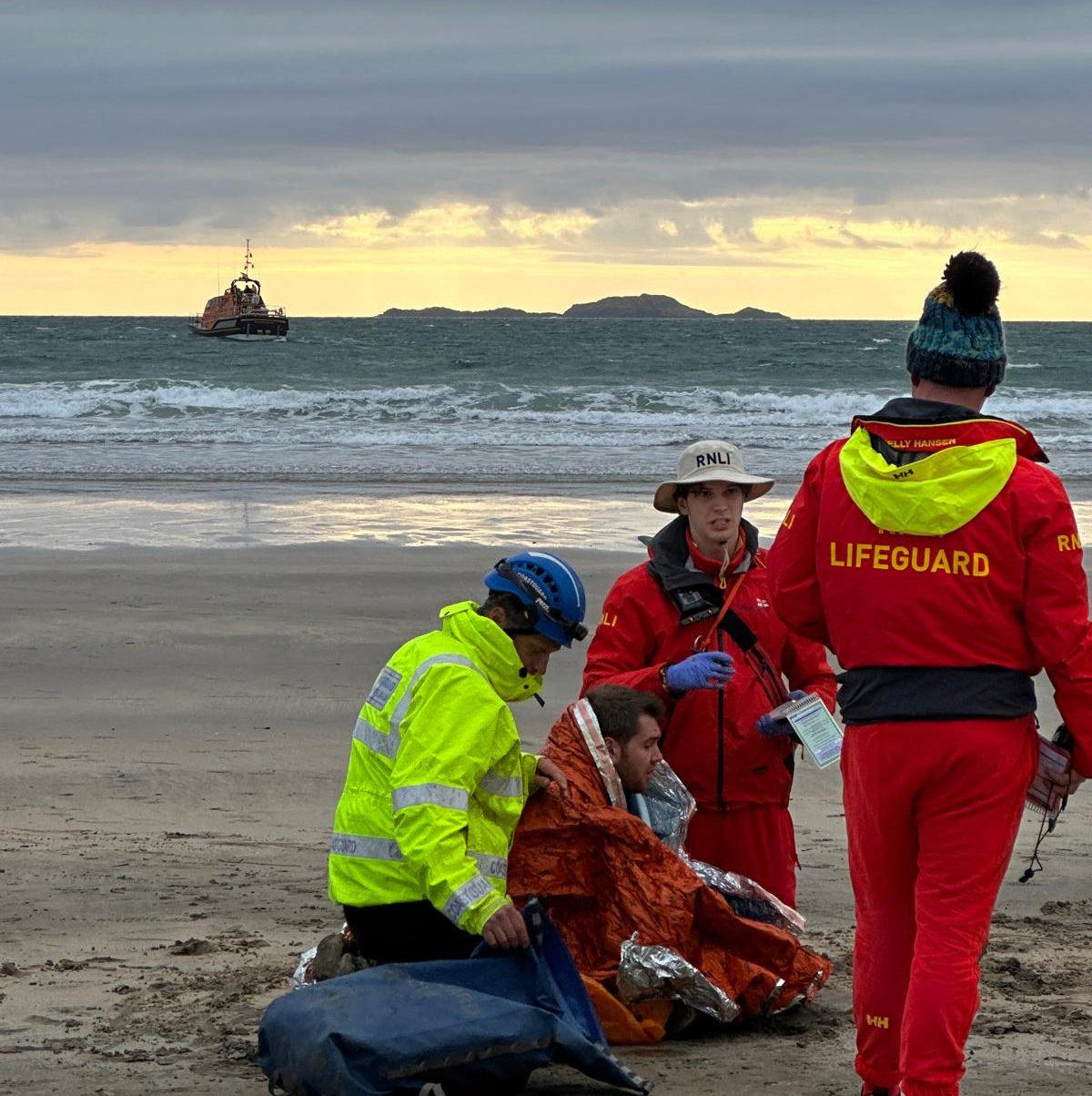
RNLI lifeguards from the north Pembrokeshire team, volunteers from St Davids RNLI and St Davids Coastguard Rescue Team came together at Whitesands beach on Thursday (18 April), for a multi-agency medical training exercise. Pembrokeshire RNLI lifeguards and St Davids volunteer lifeboat crew took part in a multi-agency medical training exercise alongside St Davids Coastguard Rescue Team in preparation for the upcoming summer season.
The Coastal Medicine programme was set up six years ago at the suggestion of clinicians from Hywel Dda University Health Board. The aim of the programme is train lifeguards, lifeboat crews and HM Coastguard teams in working collaboratively when responding to medical incidents on the coast.
Clinicians from Hywel Dda work with RNLI staff to design exercises simulating mass-casualty incidents on land and afloat. The exercises allow lifeguards, lifeboat crews and Coastguard teams to practise and test their rescue response and casualty care.
The simulated incident at Whitesands involved a medical incident at sea leading to a boat going out of control and ploughing through a group of swimmers causing multiple injuries. RNLI lifeguards responded to casualties on the beach while St Davids inshore and all-weather lifeboat crews dealt with the situation at sea. St Davids Coastguard Rescue supported RNLI colleagues as they would in a real-life scenario.
In total there were six casualties to treat, all of whom were given the immediate medical care by the teams on scene. As in a real-life scenario, they were then prepared to be handed over to the care of the Ambulance Service.
Roger Smith, RNLI Area Lifesaving Manager said: ‘The scenario was based on a real-life incident, it’s so important that we train in dealing with challenging situations.
‘The RNLI lifeguards, lifeboat crew, and the Coastguard rescue team worked really well together collaborating together to achieve the best possible result.
‘The feedback from all the participants was really positive, and our medical colleagues were very complimentary about the competence shown and the inter-agency co-operation.
‘This scenario training gives confidence to our lifeguards and lifeboat crews, and ensures the teamwork and communication is already in place ready for real-life incidents.’
Martin Charlton, an RNLI lifeguard in north Pembrokeshire said:
‘Last night’s exercise was a great opportunity for me and my colleagues on the lifeguard team to upskill ahead of the summer season.
‘We regularly attend incidents in the season that require a multi-agency response. These scenarios are a brilliant opportunity to prepare for the the most challenging situations.
‘The team and I thoroughly enjoyed the exercise and feel better prepared for the season as a result.
‘It’s always a pleasure working alongside the Coastguard rescue team and the lifeboat as one crew.’
-

 News6 days ago
News6 days agoSearch for missing teenager Luke continues at Pembroke Dock
-

 News4 days ago
News4 days agoPolice issue update on the search for Luke, missing from Pembroke Dock
-

 Crime7 days ago
Crime7 days agoEstate agents admit health and safety failings following fatal market incident
-

 News6 days ago
News6 days agoMan jailed after scarring police officer in Narberth altercation
-

 News6 days ago
News6 days agoPembrokeshire hostel manager narrowly avoids jail sentence
-

 Sport5 days ago
Sport5 days agoHerbrandston Clinch Promotion to Division One
-

 News3 days ago
News3 days ago20mph U-turn: Some roads will return to 30mph following public outcry
-

 Community3 days ago
Community3 days agoMiracle pup finds her forever home after heart-wrenching journey

















